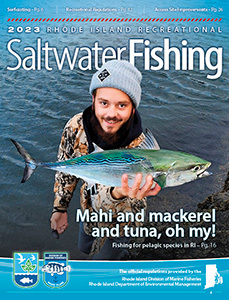General Information
Our Mission...
The Department of Environmental Management mission is to ensure that the freshwater, marine, and wildlife resources of the State of Rhode Island will be conserved and managed for equitable and sustainable use. The Department is divided into three separate divisions: Marine Fisheries, Freshwater Fisheries, and Wildlife Management.
The Division of Marine Fisheries conducts research and monitoring of marine species to support the effective management of finfish, crustaceans, and shellfish of commercial and recreational importance. Some of the programs and projects that the Division is responsible for to support the proper management of marine species are resource assessment surveys including the trawl survey and the Narragansett Bay and coastal pond seine surveys, as well as shellfish relaying and transplants, sea and port sampling, stock assessment modeling work, and aquaculture and dredging project permit reviews. The Division is also responsible for developing and maintaining a wide array of regulations on marine species including setting seasons, size limits, harvest methods and equipment, and daily possession limits.
The Division provides information and outreach materials, including press releases, brochures, website, fact sheets, and this fishing guide to convey regulations and marine related topics to the regulated community and general public.
The Division also works closely and collaboratively with the Rhode Island Marine Fisheries Council (RIMFC) to advise the DEM Director on a multitude of marine related matters.
If you have any questions about this guide or Rhode Island’s marine recreational fisheries, please contact:
John Lake
Supervising Marine Biologist
3 Fort Wetherill Rd.
Jamestown, RI 02835
(401) 423-1942
Rhode Island Environmental Police –
Division of Law Enforcement
Dean Hoxsie, Chief
The mission of the Environmental Police is to protect our natural resources and ensure compliance with all environmental conservation laws through law enforcement and education.
The history of the Environmental Police dates back to 1842 when the first game wardens were appointed to the Commission of Shellfisheries.
Today, Environmental Police Officers are sworn law enforcement officers who are responsible for patrolling and enforcing all laws, rules and regulations pertaining to the state’s fish, wildlife, boating safety and marine resources as well as all criminal and motor vehicle laws within the state parks and management areas. Officers patrol over 60,000 acres of state land, 92 salt and freshwater boat launching and fishing areas, 300 miles of rivers and streams, and 417 miles of coastline. They are also cross-deputized with the U.S. Fish & Wildlife Service and the National Marine Fisheries Service. During their patrols, they educate the public on the protection of our natural resources and provide safety for the public while enjoying Rhode Island’s outdoors.
To report violations, please call: (401) 222-3070

Life Jackets; Wear Them!
- Always remember to wear a life jacket.
- Make sure your life jacket is U.S.C.G. approved.
- Take the time to ensure a proper fit.
- Life jackets meant for adults do not work for children.
- Children under 13 years old must wear a life jacket.
- All operators and passengers of canoes, kayaks, sailboards, kiteboards, paddleboards, and any other paddle craft must always wear a United States Coast Guard (USCG)-approved PFD while underway regardless of age.

